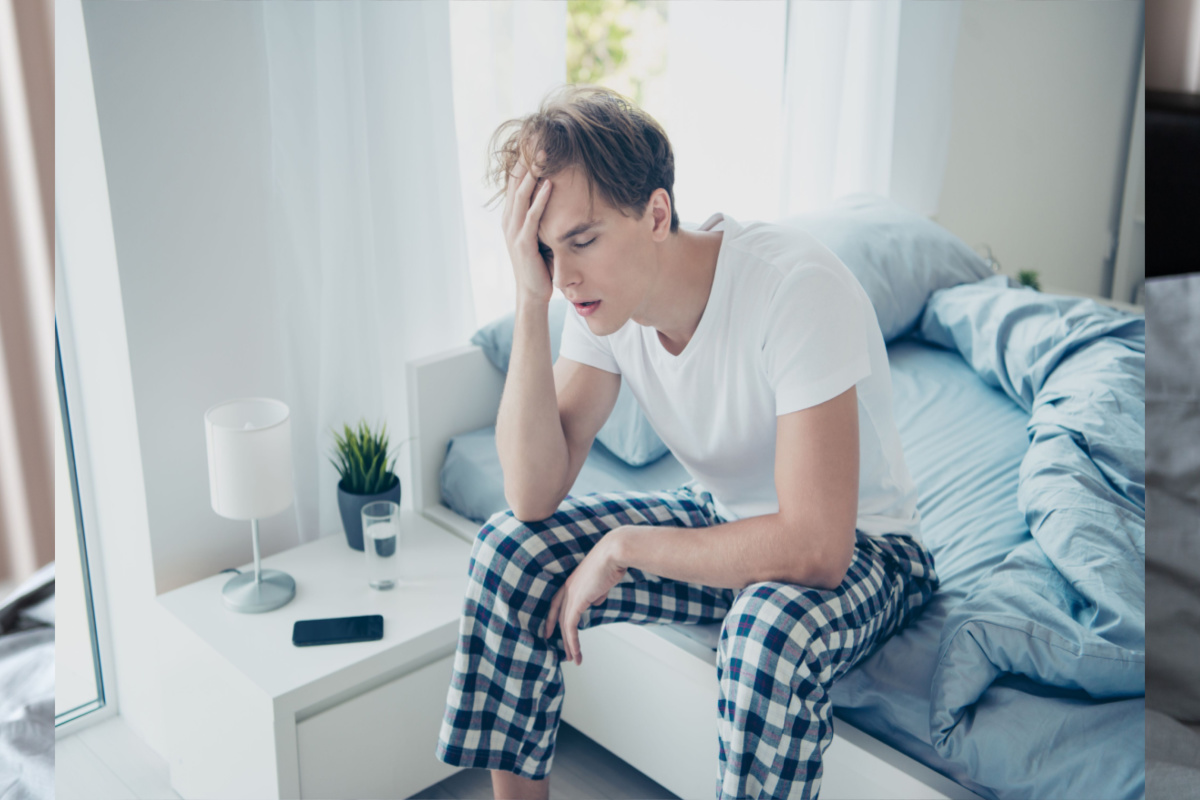Migraine hangover, also known as “postdrome,” is the final stage of a migraine attack and can last anywhere from 24 hours to several days after the acute headache has subsided.
During this time, sufferers often feel drained and exhausted, with symptoms such as confusion, difficulty concentrating, dizziness, irritability, soreness in the head and scalp, and sensitivity to light or sound.
Those who suffer from migraines must practice self-care to manage their migraine hangover and reduce its severity.
Understanding Migraine Hangover
To deal with a migraine hangover, it is vital to understand it fully.
Migraine Hangover and Its Symptoms
Typically, the symptoms of a migraine hangover will begin to appear within the first 24 hours after an attack. These include:
- Fatigue and exhaustion
- Mild confusion or difficulty concentrating
- Light and sound sensitivity
- Dizziness
- Irritability or mood swings
Difference between migraine hangover and other stages of migraines
It is essential to understand that migraines are divided into four distinct stages: prodrome, aura, headache, and postdrome. The migraine hangover (postdrome) is the fourth and final stage of the attack and is associated with a range of symptoms different from those experienced in other phases.
Treatment options for migraine hangover
There are a number of ways to treat migraine hangovers. These include:
- Managing stress levels – Stress can be a significant trigger for migraines, and managing your stress levels is one of the most effective ways to reduce the frequency and severity of attacks. Taking regular breaks throughout the day, engaging in relaxation activities such as yoga or mindfulness, and developing healthy sleep habits can all help to reduce stress.
- Medications – Over-the-counter medications such as ibuprofen, acetaminophen, and naproxen may be taken to reduce the severity of the hangover symptoms. If these are insufficient, your doctor may prescribe stronger or a combination of medications.
- Rest – Rest is one of the most critical aspects of managing migraine hangovers. Taking regular breaks throughout the day and getting plenty of sleep can help to reduce symptoms and prevent further attacks.
- Healthy diet – Eating a healthy, balanced diet can significantly reduce the frequency and severity of migraines. Include plenty of fresh fruits, vegetables, lean protein sources, and whole grains in your diet. Avoid foods such as processed food, red wine, and aged cheeses that trigger migraines.
- Exercise – Regular exercise can help to reduce migraine attacks and the accompanying hangover symptoms. Take out at least 30 minutes of moderate exercise four times a week.
- Prevention – Lastly, take steps to prevent migraine attacks in the first place. Keep track of your triggers and make sure to avoid them whenever possible. Additionally, practice relaxation techniques such as yoga or meditation regularly to help reduce stress levels. If the migraines are frequent enough, your doctor may recommend starting a migraine preventive treatment.
The Physical Impact of Migraine Hangover
Whether you are a migraine sufferer or know someone who is, this information can be incredibly valuable in understanding and coping with the condition. So, let’s go in depth and learn more about its physical symptoms.
Physical symptoms of a migraine hangover
A migraine hangover can have a significant physical impact on those who suffer from it. It can leave them feeling weak and exhausted for days, making everyday activities such as work or school difficult. Additionally, the dizziness associated with migraine hangovers may interfere with daily tasks like driving or operating machinery and cause people to become easily disoriented. As many of my patients explain it, they feel like they were “hit by a bus”.
Importance of addressing physical symptoms to manage migraine hangover
It is essential to address the physical symptoms of migraine hangovers to manage the condition and reduce its effects. Taking regular breaks throughout the day, eating a healthy diet, getting plenty of sleep, and exercising regularly can all help to reduce fatigue and dizziness associated with migraine hangovers.
Additionally, stress management techniques such as yoga or mindfulness may be beneficial in reducing the severity of attacks. Tell your doctor if these measures are ineffective in managing symptoms, as they may need to adjust your medication or treatment plan.
Nothing can ruin a day like the lingering effects of a migraine hangover. But with proper preventative measures and personalized treatment plans, you don’t have to allow migraines to control your life! Keeping track of individual triggers can help find relief from debilitating episodes so that everyone has an opportunity to live each day fully and joyfully.
The Emotional Impact of Migraine Hangover
Postdrome affects not only physical well-being but also emotional and mental health. It’s important to understand the emotional symptoms of a migraine hangover and to learn ways to manage and cope with it.
Emotional symptoms of a migraine hangover
In addition to the physical symptoms of a migraine hangover, many people also experience emotional symptoms. These can range from feelings of depression or anxiety to irritability and fogginess. It is essential to recognize these symptoms to manage them properly.
Tips for managing emotional symptoms
Creating a supportive environment to manage the emotional symptoms of a migraine hangover is essential. This can include finding someone to talk to and engaging in activities that make you feel better, such as reading or going for a walk. Additionally, maintaining healthy relationships with family and friends can also be beneficial in reducing stress levels.
Combating migraine hangovers is a unique journey for each individual. Track your triggers and try to steer clear of them whenever you can – ultimately paving the way for relief from these pesky after-effects! With some preventive care and effective treatment solutions, anyone with this condition can look forward to living life at its peak potential again.
Benefits of mindfulness and meditation for managing migraine hangover
Cultivating mindfulness and meditation can be a powerful tool to help combat the stress associated with migraine hangovers. It is possible to reduce their frequency and improve the overall quality of life through repeated practice. Remember, this technique isn’t exclusively for those struggling with migraines; anyone looking to manage anxiety better or relieve day-to-day tensions will greatly benefit from delving into these practices!
Self-care for Managing Migraine Hangover
Self-care is essential for managing migraines and reducing the effects of a hangover. Taking regular breaks throughout the day, getting plenty of sleep, eating a healthy balanced diet, and exercising regularly can all help to reduce fatigue and dizziness associated with migraine hangovers.
Importance of self-care in managing migraine hangover
Self-care is an essential aspect of managing migraine hangovers, as it can help alleviate the physical and emotional symptoms of this condition. By practicing self-care, individuals can take proactive steps to reduce these symptoms and improve their overall well-being. They can also reduce the symptoms of migraine, such as fatigue, brain fog, and irritability.
Tips for self-care
- It is important to prioritize self-care when managing migraine hangovers. This can include getting plenty of rest, eating a balanced diet, and engaging in activities that make you feel better, such as reading or going for a walk.
- Maintaining healthy relationships with family and friends can also be beneficial in reducing stress levels associated with migraine hangovers.
- Stress can trigger migraines and exacerbate symptoms of migraine hangovers. Finding healthy ways to manage stress, such as meditation, yoga, or exercise, can be helpful.
- Engaging in activities that you enjoy, connecting with loved ones, and practicing mindfulness can all help to reduce feelings of irritability, anxiety, and depression.
- And last, remember to take it easy on yourself, be kind to yourself, and know that everyone is different and that what works for one person may not work for another.
Combining Self-care and Medical Treatment
Combining medical treatments and self-care can be an effective way to manage the aftermath of a migraine. Each person must consider their individual needs when handling these lingering symptoms, as no two cases are alike!
Types of treatments for migraine hangover and how they can be used in combination with self-care
Several treatments are available for migraine hangovers, including medication, lifestyle modifications, and alternative therapies. Medication is typically used to alleviate symptoms such as pain and nausea.
Alternative therapies such as acupuncture or massage may also be beneficial in reducing the severity of attacks.
Additionally, lifestyle modifications can help reduce the frequency of attacks by avoiding known triggers and reducing stress levels.
Creating a comprehensive plan for managing migraine hangover
Creating a comprehensive plan for managing migraine hangovers is essential. This plan should include self-care strategies, medical treatments, and lifestyle modifications tailored to the individual. Additionally, it is vital to keep track of triggers and symptoms to identify patterns that can help reduce the frequency of attacks. Finally, you must talk to your healthcare provider if these measures are ineffective in managing symptoms, as they may need to adjust your medication or treatment plan.
Creating a comprehensive plan for managing migraine hangovers can reduce the frequency and severity of attacks, leading to improved quality of life.
Conclusion
Migraine hangovers can be debilitating, but they are manageable with the proper treatment and self-care strategies. It is essential to recognize the importance of medical treatment and self-care when managing migraine hangovers, as each person’s needs may vary. Taking the time to create a comprehensive plan for managing migraine hangovers can help reduce the frequency and severity of attacks, leading to improved quality of life.
Migraine hangovers can be challenging to manage, but they can reduce their frequency and severity with the right treatment and self-care strategies. By recognizing the importance of medical treatment and self-care, a personalized plan can be created to improve quality of life.
IF YOU HAVE HEADACHE, MIGRAINE, OR FACIAL PAIN AND ARE LOOKING FOR ANSWERS ON ANYTHING RELATED TO IT, A HEADACHE SPECIALIST IS HERE TO HELP, FOR FREE!
FIRST, LET’S DECIDE WHERE TO START:
IF YOU HAVE AN EXISTING HEADACHE, MIGRAINE, OR FACIAL PAIN DIAGNOSIS AND ARE LOOKING FOR THE LATEST INFORMATION, HOT TOPICS, AND TREATMENT TIPS, VISIT OUR FREE BLOG OF HOT TOPICS AND HEADACHE TIPS HERE. THIS IS WHERE I WRITE AND CONDENSE A BROAD VARIETY OF COMMON AND COMPLEX MIGRAINE AND HEADACHE RELATED TOPICS INTO THE IMPORTANT FACTS AND HIGHLIGHTS YOU NEED TO KNOW, ALONG WITH PROVIDING FIRST HAND CLINICAL EXPERIENCE FROM THE PERSPECTIVE OF A HEADACHE SPECIALIST.
IF YOU DON’T HAVE AN EXISTING HEADACHE, MIGRAINE, OR FACIAL PAIN DIAGNOSIS AND ARE LOOKING FOR POSSIBLE TYPES OF HEADACHES OR FACIAL PAINS BASED ON YOUR SYMPTOMS, USE THE FREE HEADACHE AND FACIAL PAIN SYMPTOM CHECKER TOOL DEVELOPED BY A HEADACHE SPECIALIST NEUROLOGIST HERE!
IF YOU HAVE AN EXISTING HEADACHE, MIGRAINE, OR FACIAL PAIN DIAGNOSIS AND ARE LOOKING FOR FURTHER EDUCATION AND SELF-RESEARCH ON YOUR DIAGNOSIS, VISIT OUR FREE EDUCATION CENTER HERE.



